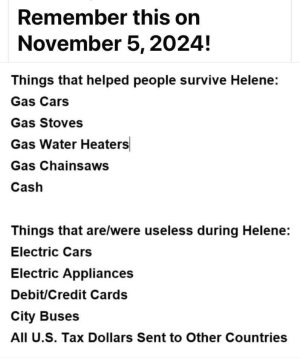-
In Memory of Rebarcock.
As we navigate life without Pat 'Rebarcock.' Flood, who passed on Sept 21, 2025, we continue to remember the profound impact he had on our community. His support was a cornerstone for our forum. We encourage you to visit the memorial thread to share your memories and condolences. In honor of Pat’s love for storytelling, please contribute to his ‘Rebarcock tells a story’ thread. Your stories will help keep his spirit alive among us.
You are using an out of date browser. It may not display this or other websites correctly.
You should upgrade or use an alternative browser.
You should upgrade or use an alternative browser.
Master Thread Dance Your Cares Away/Fraggle/Law Abiding Citizens
- Thread starter Bryan74b
- Start date
Master Threads

LARA 🇺🇸 #WomenForTrump on GETTR : I love this picture! I love this man! President Trump hanging out at Javiel’s Barbershop, just chatting with the g...
I love this picture! I love this man! President Trump hanging out at Javiel’s Barbershop, just chatting with the guys there. 🇺🇸Sometimes he’s just our best friend! ❤️
‘Likely To Give Birth Any Day’: Ruben Gallego Served Pregnant Wife With Divorce Papers. She Was Blindsided.
On Dec. 15, 2016, Rep. Ruben Gallego (D., Ariz.) filed for divorce from his wife, Kate Gallego, then a Phoenix city councilwoman. He filed a motion to seal the case file on the same day. That seal was lifted on Thursday after a 10-month court battle between the Gallegos and the Washington Free...
Goldhedge
Legendary
should get you in the ballparkAnyone have that link to the recent cancer study referencing the different dewormer/anti parasite meds?
Lettuce get ready to RUMMMBBLLLEEE!

 www.foxnews.com
www.foxnews.com

Trump takes jabs at Harris during keynote at Al Smith dinner, vows to correct 'serious problems' in US
Former President Trump will headline the Al Smith Catholic charity dinner in New York on Thursday, after Vice President Kamala Harris snubbed the event and will send a video message instead.
AgEngDawg
Legendary
Sounds like Elon put some money in get out the vote.
Goldhedge
Legendary
Unlike Zuckerbug...Sounds like Elon put some money in get out the vote.
She dumb... real dumb
Lol she’s a crazy bitch. Dude handled this crazy bitch with ease and class. He’s probably got some crazy bitches in his life he has to deal with on occasion, and he’s drawing on his experience. This should be a good teaching example of how to deal with a crazy bitch. Nice job, Mr Aikman.
Last edited:
I hope Bartiromo's big rack is in the background, like in 16Lettuce get ready to RUMMMBBLLLEEE!

Trump takes jabs at Harris during keynote at Al Smith dinner, vows to correct 'serious problems' in US
Former President Trump will headline the Al Smith Catholic charity dinner in New York on Thursday, after Vice President Kamala Harris snubbed the event and will send a video message instead.www.foxnews.com
She dumb... real dumb
Naysayers.
I'm sure this could be amended if we'd only pay more taxes...

Updated Thu, October 17, 2024 at 5:14 PM CDT·4 min read
3.6k
Humanity has thrown the global water cycle off balance “for the first time in human history,” fueling a growing water disaster that will wreak havoc on economies, food production and lives, according to a landmark new report.
Decades of destructive land use and water mismanagement have collided with the human-caused climate crisis to put “unprecedented stress” on the global water cycle, said the report published Wednesday by the Global Commission on the Economics of Water, a group of international leaders and experts.
The water cycle refers to the complex system by which water moves around the Earth. Water evaporates from the ground — including from lakes, rivers and plants — and rises into the atmosphere, forming large rivers of water vapor able to travel long distances, before cooling, condensing and eventually falling back to the ground as rain or snow.
https://www.yahoo.com/news/phoenix-ends-21-day-streak-213548976.html
Disruptions to the water cycle are already causing suffering. Nearly 3 billion people face water scarcity. Crops are shriveling and cities are sinking as the groundwater beneath them dries out.
The consequences will be even more catastrophic without urgent action. The water crisis threatens more than 50% of global food production and risks shaving an average of 8% off countries’ GDPs by 2050, with much higher losses of up to 15% projected in low-income countries, the report found.
“For the first time in human history, we are pushing the global water cycle out of balance,” said Johan Rockström, co-chair of the Global Commission on the Economics of Water and a report author. “Precipitation, the source of all freshwater, can no longer be relied upon.”

Graphic showing the movement of "green water" and "blue water" in the global water cycle. - Global Commission on the Economics of Water
The report differentiates between “blue water,” the liquid water in lakes, rivers and aquifers, and “green water,” the moisture stored in soils and plants.
While the supply of green water has long been overlooked, it is just as important to the water cycle, the report says, as it returns to the atmosphere when plants release water vapor, generating about half of all rainfall over land.
Disruptions to the water cycle are “deeply intertwined” with climate change, the report found.
A stable supply of green water is vital for supporting vegetation that can store planet-heating carbon. But the damage humans inflict, including destroying wetlands and tearing down forests, is depleting these carbon sinks and accelerating global warming. In turn, climate change-fueled heat is drying out landscapes, reducing moisture and increasing fire risk.
The crisis is made more urgent by the huge need for water. The report calculates that, on average, people need a minimum of about 4,000 liters (just over 1,000 gallons) a day to lead a “dignified life,” far above the 50 to 100 liters the United Nations says is needed for basic needs, and more than most regions will be able to provide from local sources.

A boat on the Rio Negro in Manaus, Brazil, on October 9, 2024, as the river reached its lowest level on record during the most intense and widespread drought the country has experienced since 1950. - Bruno Kelly/Reuters
Richard Allan, a climate science professor at Reading University, England, said the report “paints a grim picture of human-caused disruption to the global water cycle, the most precious natural resource that ultimately sustains our livelihoods.”
Human activities “are altering the fabric of our land and the air above which is warming the climate, intensifying both wet and dry extremes, and sending wind and rainfall patterns out of kilter,” added Allan, who was not involved in the report.
The crisis can only be addressed through better management of natural resources and massive cuts in planet-heating pollution, he told CNN.
The report’s authors say world governments must recognize the water cycle as a “common good” and address it collectively. Countries are dependent on each other, not only through lakes and rivers that span borders, but also because of water in the atmosphere, which can travel huge distances — meaning decisions made in one country can disrupt rainfall in another.

Dead almond trees removed by a farmer because of a lack of water to irrigate them, in drought-stricken Huron, California, on July 23, 2021. - Robyn Beck/AFP/Getty Images
The report calls for a “fundamental regearing of where water sits in economies,” including better pricing to discourage wastefulness and the tendency to plant water-thirsty crops and facilities, such as data centers, in water-stressed regions.
“The global water crisis is a tragedy but is also an opportunity to transform the economics of water,” said Ngozi Okonjo-Iweala, director general of the World Trade Organization and a co-chair of the commission that published the report. Valuing water properly is essential, she added, “so as to recognize its scarcity and the many benefits it delivers.”
The system that moves water around the Earth is off balance for the first time in human history
Laura PaddisonUpdated Thu, October 17, 2024 at 5:14 PM CDT·4 min read
3.6k
Humanity has thrown the global water cycle off balance “for the first time in human history,” fueling a growing water disaster that will wreak havoc on economies, food production and lives, according to a landmark new report.
Decades of destructive land use and water mismanagement have collided with the human-caused climate crisis to put “unprecedented stress” on the global water cycle, said the report published Wednesday by the Global Commission on the Economics of Water, a group of international leaders and experts.
The water cycle refers to the complex system by which water moves around the Earth. Water evaporates from the ground — including from lakes, rivers and plants — and rises into the atmosphere, forming large rivers of water vapor able to travel long distances, before cooling, condensing and eventually falling back to the ground as rain or snow.
https://www.yahoo.com/news/phoenix-ends-21-day-streak-213548976.html
Disruptions to the water cycle are already causing suffering. Nearly 3 billion people face water scarcity. Crops are shriveling and cities are sinking as the groundwater beneath them dries out.
The consequences will be even more catastrophic without urgent action. The water crisis threatens more than 50% of global food production and risks shaving an average of 8% off countries’ GDPs by 2050, with much higher losses of up to 15% projected in low-income countries, the report found.
“For the first time in human history, we are pushing the global water cycle out of balance,” said Johan Rockström, co-chair of the Global Commission on the Economics of Water and a report author. “Precipitation, the source of all freshwater, can no longer be relied upon.”
Graphic showing the movement of "green water" and "blue water" in the global water cycle. - Global Commission on the Economics of Water
The report differentiates between “blue water,” the liquid water in lakes, rivers and aquifers, and “green water,” the moisture stored in soils and plants.
While the supply of green water has long been overlooked, it is just as important to the water cycle, the report says, as it returns to the atmosphere when plants release water vapor, generating about half of all rainfall over land.
Disruptions to the water cycle are “deeply intertwined” with climate change, the report found.
A stable supply of green water is vital for supporting vegetation that can store planet-heating carbon. But the damage humans inflict, including destroying wetlands and tearing down forests, is depleting these carbon sinks and accelerating global warming. In turn, climate change-fueled heat is drying out landscapes, reducing moisture and increasing fire risk.
The crisis is made more urgent by the huge need for water. The report calculates that, on average, people need a minimum of about 4,000 liters (just over 1,000 gallons) a day to lead a “dignified life,” far above the 50 to 100 liters the United Nations says is needed for basic needs, and more than most regions will be able to provide from local sources.
A boat on the Rio Negro in Manaus, Brazil, on October 9, 2024, as the river reached its lowest level on record during the most intense and widespread drought the country has experienced since 1950. - Bruno Kelly/Reuters
Richard Allan, a climate science professor at Reading University, England, said the report “paints a grim picture of human-caused disruption to the global water cycle, the most precious natural resource that ultimately sustains our livelihoods.”
Human activities “are altering the fabric of our land and the air above which is warming the climate, intensifying both wet and dry extremes, and sending wind and rainfall patterns out of kilter,” added Allan, who was not involved in the report.
The crisis can only be addressed through better management of natural resources and massive cuts in planet-heating pollution, he told CNN.
The report’s authors say world governments must recognize the water cycle as a “common good” and address it collectively. Countries are dependent on each other, not only through lakes and rivers that span borders, but also because of water in the atmosphere, which can travel huge distances — meaning decisions made in one country can disrupt rainfall in another.
Dead almond trees removed by a farmer because of a lack of water to irrigate them, in drought-stricken Huron, California, on July 23, 2021. - Robyn Beck/AFP/Getty Images
The report calls for a “fundamental regearing of where water sits in economies,” including better pricing to discourage wastefulness and the tendency to plant water-thirsty crops and facilities, such as data centers, in water-stressed regions.
“The global water crisis is a tragedy but is also an opportunity to transform the economics of water,” said Ngozi Okonjo-Iweala, director general of the World Trade Organization and a co-chair of the commission that published the report. Valuing water properly is essential, she added, “so as to recognize its scarcity and the many benefits it delivers.”
Learn to

Hamas leader Yahya Sinwar weakly threw piece of wood at Israeli drone just moments before he was killed, shocking footage shows
An Israeli drone captured Hamas chief Yahya Sinwar’s last minutes alive — as the Oct. 7 mastermind swung a piece of wood in a futile attempt to take out the device before he was killed,…

AOC faces censure from Democratic Socialists for recognizing Israel’s right to exist — despite pol’s criticisms of Hamas war
The New York chapter of thee Democratic Socialists of America is presenting a resolution to “censure” Rep. Alexandria Ocasio-Cortez for ailing to sufficiently support “Palestinian…

Amazon exec tells employees to quit if they don’t want to work 5 days a week in office: ‘There are other companies around’
The policy has upset many of Amazon’s employees who say it wastes time with commuting and the benefits of working from the office are not supported by independent data.
I don't thinksoI hope Bartiromo's big rack is in the background, like in 16
dirtytoeddawg
Legendary
I'd bet the almond farmer sold out to solar panels. Many farmers are.I'm sure this could be amended if we'd only pay more taxes...
The system that moves water around the Earth is off balance for the first time in human history
Laura Paddison
Updated Thu, October 17, 2024 at 5:14 PM CDT·4 min read
3.6k
Humanity has thrown the global water cycle off balance “for the first time in human history,” fueling a growing water disaster that will wreak havoc on economies, food production and lives, according to a landmark new report.
Decades of destructive land use and water mismanagement have collided with the human-caused climate crisis to put “unprecedented stress” on the global water cycle, said the report published Wednesday by the Global Commission on the Economics of Water, a group of international leaders and experts.
The water cycle refers to the complex system by which water moves around the Earth. Water evaporates from the ground — including from lakes, rivers and plants — and rises into the atmosphere, forming large rivers of water vapor able to travel long distances, before cooling, condensing and eventually falling back to the ground as rain or snow.
https://www.yahoo.com/news/phoenix-ends-21-day-streak-213548976.html
Disruptions to the water cycle are already causing suffering. Nearly 3 billion people face water scarcity. Crops are shriveling and cities are sinking as the groundwater beneath them dries out.
The consequences will be even more catastrophic without urgent action. The water crisis threatens more than 50% of global food production and risks shaving an average of 8% off countries’ GDPs by 2050, with much higher losses of up to 15% projected in low-income countries, the report found.
“For the first time in human history, we are pushing the global water cycle out of balance,” said Johan Rockström, co-chair of the Global Commission on the Economics of Water and a report author. “Precipitation, the source of all freshwater, can no longer be relied upon.”

Graphic showing the movement of "green water" and "blue water" in the global water cycle. - Global Commission on the Economics of Water
The report differentiates between “blue water,” the liquid water in lakes, rivers and aquifers, and “green water,” the moisture stored in soils and plants.
While the supply of green water has long been overlooked, it is just as important to the water cycle, the report says, as it returns to the atmosphere when plants release water vapor, generating about half of all rainfall over land.
Disruptions to the water cycle are “deeply intertwined” with climate change, the report found.
A stable supply of green water is vital for supporting vegetation that can store planet-heating carbon. But the damage humans inflict, including destroying wetlands and tearing down forests, is depleting these carbon sinks and accelerating global warming. In turn, climate change-fueled heat is drying out landscapes, reducing moisture and increasing fire risk.
The crisis is made more urgent by the huge need for water. The report calculates that, on average, people need a minimum of about 4,000 liters (just over 1,000 gallons) a day to lead a “dignified life,” far above the 50 to 100 liters the United Nations says is needed for basic needs, and more than most regions will be able to provide from local sources.

A boat on the Rio Negro in Manaus, Brazil, on October 9, 2024, as the river reached its lowest level on record during the most intense and widespread drought the country has experienced since 1950. - Bruno Kelly/Reuters
Richard Allan, a climate science professor at Reading University, England, said the report “paints a grim picture of human-caused disruption to the global water cycle, the most precious natural resource that ultimately sustains our livelihoods.”
Human activities “are altering the fabric of our land and the air above which is warming the climate, intensifying both wet and dry extremes, and sending wind and rainfall patterns out of kilter,” added Allan, who was not involved in the report.
The crisis can only be addressed through better management of natural resources and massive cuts in planet-heating pollution, he told CNN.
The report’s authors say world governments must recognize the water cycle as a “common good” and address it collectively. Countries are dependent on each other, not only through lakes and rivers that span borders, but also because of water in the atmosphere, which can travel huge distances — meaning decisions made in one country can disrupt rainfall in another.

Dead almond trees removed by a farmer because of a lack of water to irrigate them, in drought-stricken Huron, California, on July 23, 2021. - Robyn Beck/AFP/Getty Images
The report calls for a “fundamental regearing of where water sits in economies,” including better pricing to discourage wastefulness and the tendency to plant water-thirsty crops and facilities, such as data centers, in water-stressed regions.
“The global water crisis is a tragedy but is also an opportunity to transform the economics of water,” said Ngozi Okonjo-Iweala, director general of the World Trade Organization and a co-chair of the commission that published the report. Valuing water properly is essential, she added, “so as to recognize its scarcity and the many benefits it delivers.”
Similar threads
- Replies
- 13
- Views
- 546
- Replies
- 4
- Views
- 245
- Replies
- 0
- Views
- 2K
- Replies
- 56
- Views
- 5K


















